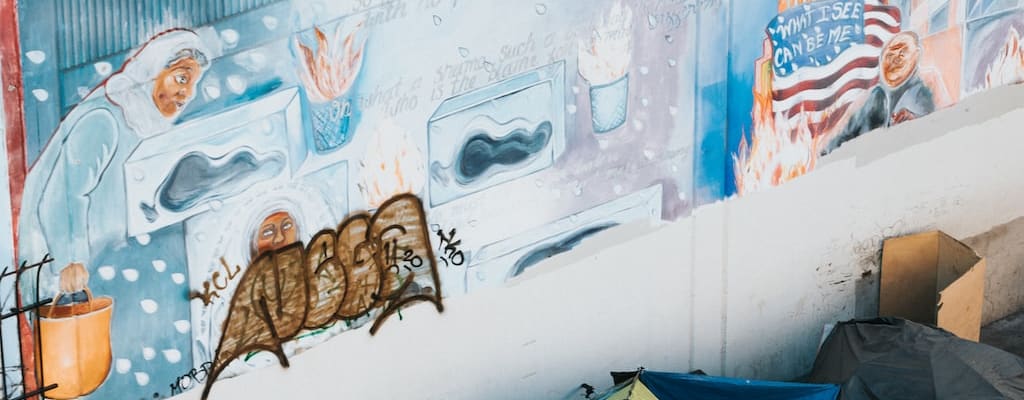rough sleeper: Idiom Meaning and Origin
What does ‘rough sleeper’ mean?
A rough sleeper refers to a person who is homeless and sleeps outside, often on the streets or in temporary shelters. They do not have a fixed place to live and are exposed to the elements, facing numerous challenges related to safety, health, and security.

Idiom Explorer
The idiom "saddle tramp" refers to a person, often a cowboy, who leads a nomadic and independent life, moving from place to place and finding work where it is available without a permanent home or stable job.
"Sacked out" is an idiom that means to be in a deep sleep or to be completely exhausted. It is often used to describe someone who is sleeping soundly or resting after a long day.
The idiom "rough trot" refers to a difficult or challenging period of time or situation. It conveys the idea of facing hardships or experiencing a series of problems.
The idiom "rough sledding" means to undergo a difficult or challenging time or situation.
The idiom *rough patch* refers to a difficult or challenging period of time in someone's life or a situation. It implies that things are not going well and there are obstacles or problems to overcome.
The idiom "roughen up" means to make something or someone rough or more aggressive, usually by adding force or intensity. It can also refer to making something appear more rugged or worn.
The idiom "rough around the edges" means that someone or something may appear imperfect or unrefined, but still has potential or qualities that make them interesting or valuable.
The idiom "rough and ready" means something or someone that is not refined or polished, but is practical and effective in a basic way.
The idiom "roof over one's head" means having a place to live or having shelter. It emphasizes the basic necessity of having a roof to protect oneself from the elements.
The idiom "rag bagger" refers to a person who collects or gathers old, discarded or worthless items, especially clothes or rags. It can also be used figuratively to describe someone who accumulates or hoards useless or unimportant things.
FAIL
The idiom "rough sleeper" refers to a person who sleeps outside or in a public place, often due to lack of a permanent residence or being homeless. This idiom originated in the United Kingdom and is commonly used there to describe individuals who live on the streets. The term "rough" in this idiom emphasizes the difficult conditions and challenges faced by those who sleep in such circumstances.
The idiom gained popularity in the late 20th century, coinciding with an increase in homelessness and urban poverty. While the idiom is primarily used in the UK, its usage has spread to other English-speaking countries, including the United States.
The idiom "rough sleeper" is typically used in a compassionate or empathetic manner to describe the plight of those experiencing homelessness. It can be used to highlight social issues, such as income inequality, lack of affordable housing, and societal challenges in addressing homelessness.
Additionally, the idiom "rough sleeper" is often used in media, discussions about social welfare, and advocacy for policies to support homeless individuals.
While the idiom primarily refers to individuals who sleep outside, it can also be used metaphorically to describe someone living in difficult or adverse conditions. This can include individuals who are vulnerable to "homeless dumping" or being abandoned on the street without any support or resources.
Being a rough sleeper means facing the harsh realities of being without a home, exposed to the elements and lacking the safety and security that a permanent residence provides. It can be incredibly challenging to find shelter, food, and other basic necessities when you are living on the street.
Rough sleepers often have to rely on the generosity of others or community support services to meet their immediate needs. They may face risks to their physical and mental health, as well as personal safety, while living on the streets.
The term "rough sleeper" brings attention to the urgent need for social and governmental action to address the root causes of homelessness and provide appropriate support and resources to those in need.
It is important to recognize that rough sleepers are not choosing to be in their current situation. Circumstances, such as financial hardship, loss of employment, or mental health issues, can contribute to individuals finding themselves without a permanent residence.
Society's response to rough sleepers can vary. Some communities have implemented initiatives to provide temporary shelters, food, and support services for those living on the streets. However, there is still much work to be done to address the systemic issues that contribute to homelessness and ensure that everyone has access to safe and affordable housing.
Ultimately, the idiom "rough sleeper" serves as a reminder of the widespread issue of homelessness and the challenges faced by those who find themselves without a place to call home. It is important to approach discussions about rough sleepers with empathy, compassion, and a commitment to finding lasting solutions to homelessness.
Example usage
Examples of how the idiom "rough sleeper" can be used in a sentence:
1. The city has implemented various programs to support rough sleepers and help them find stable housing.
2. It is heartening to see that the number of rough sleepers in our community has significantly decreased over the past year.
3. The charity organization provides emergency shelters and meals to rough sleepers during the cold winter months.
More "Homelessness" idioms



